
Giuseppe Fortunino Francesco Verdi was an Italian composer best known for his operas. He was born near Busseto, a small town in the province of Parma, to a family of moderate means, receiving a musical education with the help of a local patron, Antonio Barezzi. Verdi came to dominate the Italian opera scene after the era of Gioachino Rossini, Vincenzo Bellini, and Gaetano Donizetti, whose works significantly influenced him.

Goffredo Mameli was an Italian patriot, poet, writer and a notable figure in the Risorgimento. He is also the author of the lyrics of "Il Canto degli Italiani", the national anthem of Italy.

The unification of Italy, also known as the Risorgimento, was the 19th century political and social movement that in 1861 ended in the annexation of various states of the Italian Peninsula and its outlying isles to the Kingdom of Sardinia, resulting in the creation of the Kingdom of Italy. Inspired by the rebellions in the 1820s and 1830s against the outcome of the Congress of Vienna, the unification process was precipitated by the Revolutions of 1848, and reached completion in 1871 after the capture of Rome and its designation as the capital of the Kingdom of Italy.

Arrigo Boito was an Italian librettist, composer, poet and critic whose only completed opera was Mefistofele. Among the operas for which he wrote the libretti are Giuseppe Verdi's monumental last two operas Otello and Falstaff as well as Amilcare Ponchielli's La Gioconda.
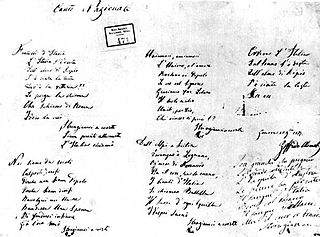
"Il Canto degli Italiani" is a patriotic song written by Goffredo Mameli and set to music by Michele Novaro in 1847, currently used as the national anthem of Italy. It is best known among Italians as the "Inno di Mameli", after the author of the lyrics, or "Fratelli d'Italia", from its opening line. The piece, in 4/4 time signature and B-flat major key, has six strophes, and a refrain sung after each. The sixth group of verses, almost never performed, recalls the first strophe's text.

Michele Novaro was an Italian composer.
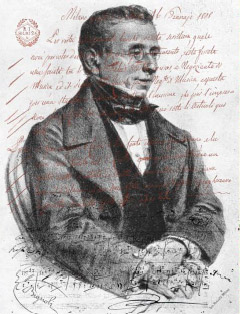
Casa Ricordi is a publisher of primarily classical music and opera. Its classical repertoire represents one of the important sources in the world through its publishing of the work of the major 19th-century Italian composers such as Gioachino Rossini, Gaetano Donizetti, Vincenzo Bellini, Giuseppe Verdi, and, later in the century, Giacomo Puccini, composers with whom one or another of the Ricordi family came into close contact.

The Messa per Rossini is a Requiem Mass composed to commemorate the first anniversary of Gioachino Rossini's death. It was a collaboration among 13 Italian composers, initiated by Giuseppe Verdi. The composition was intended to be performed on 13 November 1869 in the Basilica of San Petronio, Bologna, where Rossini grew up and spent a large part of his life.

"Va, pensiero", also known as the "Chorus of the Hebrew Slaves", is a chorus from the opera Nabucco (1842) by Giuseppe Verdi. It recollects the period of Babylonian captivity after the destruction of Solomon's Temple in Jerusalem in 586 BC.

Giuseppe Rovani was an Italian novelist and essayist. He took part in the Italian Risorgimento and was a forerunner of the Milanese Scapigliatura.

Teodulo Mabellini was an Italian composer.
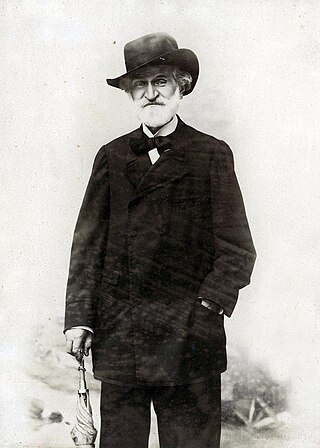
The Quattro pezzi sacri are choral works by Giuseppe Verdi. Written separately during the last decades of the composer's life and with different origins and purposes, they were nevertheless published together in 1898 by Casa Ricordi. They are often performed as a cycle, not in chronological sequence of their composition, but in the sequence used in the Ricordi publication:
"Inno al Re", disputed between Giovanni Paisiello and Pietro Pisani, was a hymn praising King Ferdinand IV of Naples, then Ferdinand I of Two Sicilies, which functioned as the national anthem of the kingdom of the Two Sicilies.
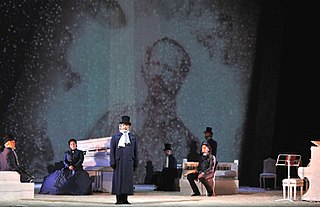
Risorgimento! is an opera in one act by Lorenzo Ferrero set to an Italian-language libretto by Dario Oliveri, based on a scenario by the composer. It was completed in 2010 and first performed at the Teatro Comunale Modena on 26 March 2011.

Inno delle nazioni, a cantata in a single movement, is one of only two secular choral works composed by Giuseppe Verdi. This Hymn incorporates "God Save the King", "La Marseillaise", and "Il Canto degli Italiani". It was the first collaboration between the composer and Arrigo Boito, who, much later, would revise the libretto of Simon Boccanegra and write the original libretti of Otello and Falstaff.

Giulietta Pezzi was an Italian writer and journalist whose work included poetry, four novels, and a five-act play. Born and educated in Milan, she was a devoted follower of Mazzini and active in the Italian republican and unification movements. In her later years she wrote for several newspapers and dedicated herself to the establishment of free public schools in Italy based on Mazzini's educational philosophy. She died in the city of her birth at the age of 71. During her lifetime several art songs were dedicated to her, including Bellini's "Vaga luna, che inargenti".
Raffaele Caravaglios was an Italian bandmaster.

Nicola De Giosa was an Italian composer and conductor active in Naples. He composed numerous operas, the most successful of which, Don Checco and Napoli di carnevale, were in the Neapolitan opera buffa genre. His other works included sacred music and art songs. His songs were particularly popular, bringing him fame as a salon composer both in Italy and abroad. De Giosa died in Bari, the city of his birth, at the age of 66.
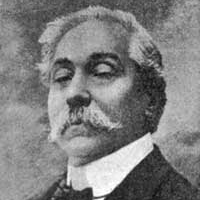
Amyntor "Amintore" Flaminio Claudio Galli was an Italian music publisher, journalist, historian, musicologist, and composer.

















